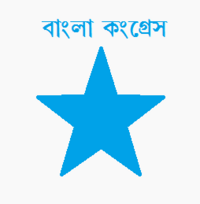Bangla Congress: Difference between revisions
No edit summary |
No edit summary |
||
| (3 intermediate revisions by the same user not shown) | |||
| Line 58: | Line 58: | ||
===In opposition and present (1997-Present)=== | ===In opposition and present (1997-Present)=== | ||
The BC has continuously been in opposition since 1997. The party's leader Hriday Chandra Bose resigned in 1998 following his party's catastrophic defeat. Jivan Basu was elected as the new party leader in 1998, but he also resigned after the party's vote reduced greatly in the 2002 elections. The party's decline continued in the following decade under the leadership of Goutam Kumar Ghosh. The party continued to face losses in the elections of 2007 and 2012. Ghosh resigned in 2015 after the party's poor result of only 32% in the subsequent regional elections, losing gubernatorial elections in all but two states. Mridul Kumar Chaterjee was elected as the new leader in 2016 after long infighting, after which he relied on modernising the party, strengthening its anti-communist rhetoric and distancing it from its past of involvement with the Ratnapur Scandals. The party gained marginal amount of votes in 2022, which allowed Chaterjee to retain leadership. | The BC has continuously been in opposition since 1997. The party's leader Hriday Chandra Bose resigned in 1998 following his party's catastrophic defeat. Jivan Basu was elected as the new party leader in 1998, but he also resigned after the party's vote reduced greatly in the 2002 elections. The party's decline continued in the following decade under the leadership of Goutam Kumar Ghosh. The party continued to face losses in the elections of 2007 and 2012. Ghosh resigned in 2015 after the party's poor result of only 32% in the subsequent regional elections, losing gubernatorial elections in all but two states. Mridul Kumar Chaterjee was elected as the new leader in 2016 after long infighting, after which he relied on modernising the party, strengthening its anti-communist rhetoric and distancing it from its past of involvement with the Ratnapur Scandals. The party gained marginal amount of votes in 2022, which allowed Chaterjee to retain leadership. | ||
==Election Results== | |||
==Publications== | |||
The BC publishes its daily newspaper Jatiya Shakti (জাতীয় শক্তি ; National Power). It also publishes monthly magazines including the Nabajagaran (নবজাগরণ-New awakening). The Jatiya Shakti has been publishing since 1957, shortly after the party was founded. | |||
==See Also== | |||
{{plainlist| | |||
*[[National Assembly (Bengaala)|National Assembly]] | |||
*[[Communist Party of Bengal]]}} | |||
Latest revision as of 09:23, 13 November 2022
This article is incomplete because it is pending further input from participants, or it is a work-in-progress by one author. Please comment on this article's talk page to share your input, comments and questions. Note: To contribute to this article, you may need to seek help from the author(s) of this page. |
Bangla Congress বাংলা কংগ্রেস | |
|---|---|
 Party Logo | |
| Abbreviation | BC |
| Leader | Mridul Kumar Chaterjee |
| President | Pratip Sarkar |
| Founder | Bidhan Chandra Roy |
| Founded | January 3, 1956 |
| Preceded by | Indian National Congress |
| Headquarters | Rasbihari Avenue, Kolkata |
| Newspaper | Jatiya Shakti (জাতীয় শক্তি) |
| Student wing | Bangla Students' Congress |
| Youth wing | Youth Congress of Bengal |
| Women's wing | Womens' Congress of Bengal |
| Membership (2019) | 958,841 |
| Ideology | |
| Political position | Centre-right to Right-wing |
| International affiliation | Liberal International |
| Colors | Blue |
| Slogan | "Democracy and Freedom!" |
| Members of NA | 90 / 294
|
| Members of PAs | 258 / 742
|
| Members of MAs | 3,073 / 8,745
|
| Flag | |
 | |
The Bangla Congress (Bengali; বাংলা কংগ্রেস ; BC) is a liberal-conservative and right-wing political party in Bengaala.
Established in 1956, it is the second oldest political party in Bengal, having split from the Bengali regional wing of the Indian National Congress. The party was the strongest electoral force since the first free elections in 1970, up until 1997, when the Ratnapur scandals caused public anger against the party-led government. The party has been the largest opposition party since then. It is one of the two largest parties in Bengaala, with its main rival being the Communist Party of Bengal. The BC is currently led by Mridul Kumar Chaterjee.
History
Split from INC and foundation (1955-1956)
Bengaala was for nearly a decade, rife in instability due to the rising desire for independence among Bengalis from the then-newly independent Indian state. The region was governed by a lieutenant general as an union territory, rather than a full state. A mass demonstration in 1955, spearheaded by both independentists and communists, led to military intervention by the Indian government, due to which a great number of protesters were killed. The ruling party INC} received heavy criticism for using force to quell the protesters. Bengali INC leader Bidhan Chandra Roy denounced the Indian state and the INC as "imperialist", and organised his own faction withing the Bengali regional wing of the INC. Roy was expelled due to anti-party activity in December 1955, and he subsequently formed the Bangla Congress in January 1956. The party was joined by the vast majority of the INC regional wing, as well as many non-communist pro-independence activists. The party adopted its constitution in March 1956, in which it envisioned a free, independent and liberal Bengali state.
Independence struggle (1956-1970)
The BC organised through political clubs and groups, and through trade unions, against the Indian state. The party still hoped to gain independence by negotiations with India, rather than a violent revolution pursued by the communists. The party remained underground for the first five years of 1960s. It appealed to the public through symbolic marches, rallies and newspaper journals, though the independence movement had largely fallen silent since the events of 1955. The party was heavily engaged in mass demonstrations of 1967-68, following the controversial decision of the government to merge Bengal with the neighbouring state of Bihar. The party also occasionally cooperated with even communists during the struggle, though these cooperations were denounced and stopped in 1968. The party's "legal revolt" against India finally led to the formation of a Constitutitonal Assembly in Bengal, which would draft a constitiution, following which Bengal would have full independence. The party came second in the elections to the Assembly in 1968, winning around 35% of the vote. However, the party enjoyed a plurality for most of the Assembly's existence, as the communists (the largest group) split into two parties, the more hardline CPB and the moderate democratic-socialist SUP. SUP initially co-operated with the BC, but later the BC refused to accept many economic and other proposals of the SUP, which led the latter to part with BC and side with the CPB. The BC, CPB and SUP supported a new constitution in 1969, and an independent Bengal was proclaimed in 1970.
Post-independence and in government (1970-1997)
The BC formed a provisional national unity government with CPB and SUP following independence. However, they also arranged elections in November 1970, refusing to continue the government for a long time, citing the presence of the communist party. The party became the largest in the 1970 elections, while the communists still suffered from the split. The CPB was influenced by the subsequent eurocommunist current in Europe, which led to them moderating their views, that enabled a permanent CPB-SUP alliance. Thus, the BC always required either on a parliamentary majority or external support from the liberal PB party. The party's long-time leader Dinesh Bose had served as prime minister of Bengal from 1970 upto his death in 1989. The party became unpopular by the time, failing to raise the poor living standards and infrastructure of the country, as well as due to its inability to curb far-right terror acts and the rise of gang crime and mafia. BC itself was accused of collaboration with mafia multiple times during its time in government. The BC was involved in the 1997 Ratnapur Scandals, which provoked nationwide judicial investigations. The whole BC leadership was involved in the corruption scandal. The full involvement of BC in the corruption scandal provoked nationwide demonstrations and protests, which forced the government to resign and hold snap elections in 1997. The BC suffered a defeat, with its ongoing coalition government with the PB losing its majority and the communists and socialists having a working majority, following which the BC went into opposition.
In opposition and present (1997-Present)
The BC has continuously been in opposition since 1997. The party's leader Hriday Chandra Bose resigned in 1998 following his party's catastrophic defeat. Jivan Basu was elected as the new party leader in 1998, but he also resigned after the party's vote reduced greatly in the 2002 elections. The party's decline continued in the following decade under the leadership of Goutam Kumar Ghosh. The party continued to face losses in the elections of 2007 and 2012. Ghosh resigned in 2015 after the party's poor result of only 32% in the subsequent regional elections, losing gubernatorial elections in all but two states. Mridul Kumar Chaterjee was elected as the new leader in 2016 after long infighting, after which he relied on modernising the party, strengthening its anti-communist rhetoric and distancing it from its past of involvement with the Ratnapur Scandals. The party gained marginal amount of votes in 2022, which allowed Chaterjee to retain leadership.
Election Results
Publications
The BC publishes its daily newspaper Jatiya Shakti (জাতীয় শক্তি ; National Power). It also publishes monthly magazines including the Nabajagaran (নবজাগরণ-New awakening). The Jatiya Shakti has been publishing since 1957, shortly after the party was founded.